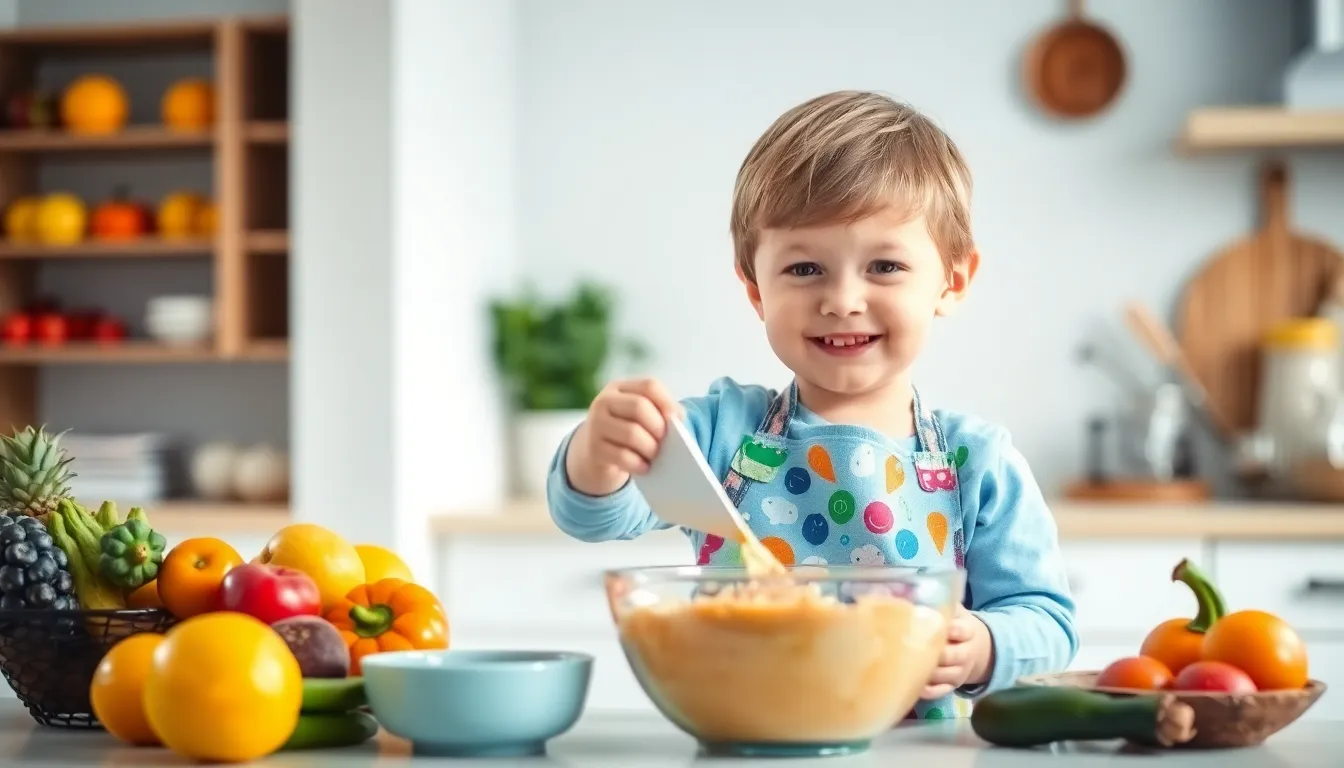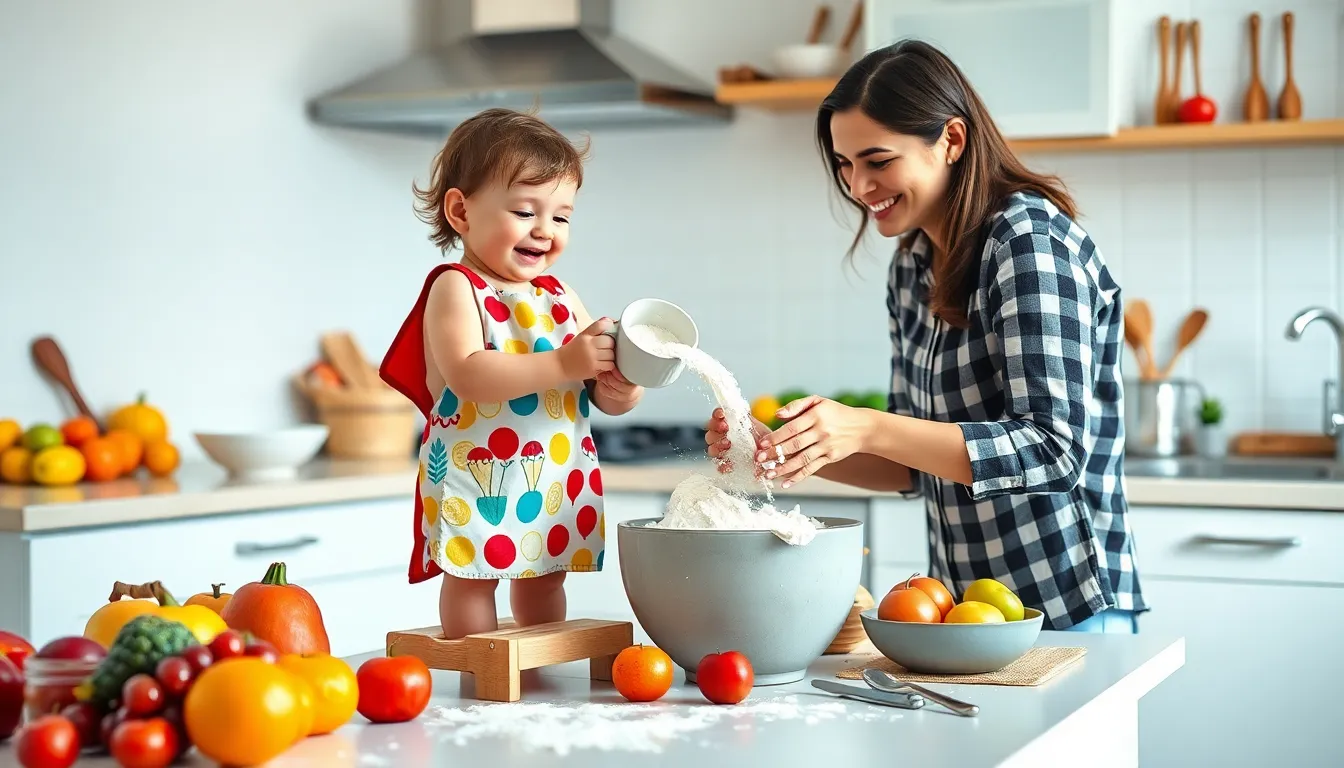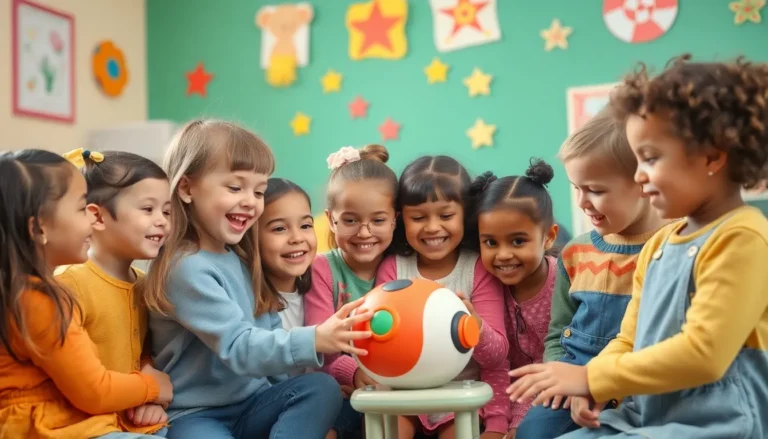Table of Contents
ToggleCooking with toddlers is like trying to teach a cat to swim—messy but oh-so-rewarding! These little chefs bring a splash of creativity and a sprinkle of chaos to the kitchen, turning everyday meals into delightful adventures. Not only do cooking activities help develop fine motor skills and boost confidence, but they also create priceless bonding moments that’ll make parents chuckle for years to come.
Benefits Of Cooking Activities For Toddlers
Cooking activities provide numerous advantages for toddlers, enhancing their overall development while fostering joyful experiences. Engaging in these tasks promotes learning and growth in various areas.
Cognitive Development
Cognitive development flourishes through cooking. Toddlers explore measuring ingredients, understanding quantities, and following directions. Engaging in these tasks strengthens problem-solving skills by requiring them to think critically about processes. Furthermore, identifying colors, shapes, and textures becomes an educational focus, which enhances sensory awareness. Cooking tasks introduce basic math concepts, enriching their understanding of numbers in a real-world context. Memory retention improves as they recall steps in recipes. Participation in cooking nurtures a curious mindset, encouraging toddlers to ask questions and seek answers related to cooking processes.
Fine Motor Skills
Fine motor skills benefit significantly from cooking activities. Grasping utensils, stirring mixtures, and pouring liquids require precise hand movements. Toddlers develop hand-eye coordination when they measure and chop (with safe tools). These tasks promote dexterity and strengthen the muscles in hands and fingers. Skills learned during cooking translate well to other areas, including writing and drawing. Experimenting with textures while kneading dough or rolling out pizza fosters tactile exploration. Engaging in cooking routines empowers them to take ownership of their tasks, boosting their confidence in handling tools independently.
Types Of Cooking Activities For Toddlers

Cooking activities for toddlers vary in creativity and engagement, allowing them to explore the kitchen safely and joyfully.
Simple Recipes
Simple recipes offer excellent opportunities for toddlers to participate in cooking. Recipes like fruit salads, yogurt parfaits, or no-bake snacks require minimal ingredients and preparation time. Toddlers can practice measuring cups, pouring liquids, and mixing ingredients, enhancing their fine motor skills. They learn the concepts of combining flavors while exploring various textures. Engaging toddlers in making simple recipes builds their confidence and instills healthy eating habits. Recipes can be adjusted based on seasonal ingredients, promoting discovery and encouraging experimentation.
Fun Food Crafts
Fun food crafts encourage toddlers to express their creativity while preparing meals. Activities such as creating vegetable animals or making sandwiches with cookie cutters transform ordinary foods into playful shapes. Toddlers enjoy arranging healthy snacks on plates, stimulating their imaginations. These crafting experiences foster cooperation, as he or she might work alongside a parent or sibling. Additionally, food crafts serve as an introduction to different food groups, paving the way for discussions about nutrition. Hands-on activities like these enrich the cooking experience, building excitement around food.
Safety Tips For Cooking With Toddlers
Cooking with toddlers requires careful attention to safety. Prioritizing a secure environment ensures a fun and educational experience for both children and adults.
Kitchen Safety
Ensuring a safe kitchen begins with monitoring the cooking area. Create boundaries using child gates to prevent access to dangerous zones. Keep sharp utensils, hot surfaces, and electrical appliances out of reach to avoid accidents. When cooking, supervising toddlers at all times allows for quick intervention if necessary. Encourage the use of kid-friendly tools, like plastic knives, to teach skills without risk. Store cleaning supplies and other hazardous materials in locked cabinets, out of their sight. Teaching toddlers about safety rules while cooking helps establish awareness of potential dangers.
Ingredient Safety
Choosing safe ingredients plays a crucial role in toddler cooking activities. Fresh produce should be washed thoroughly to remove pesticides and dirt. Always confirm that ingredients are age-appropriate and not choking hazards. Small items like grapes or cherry tomatoes, when cut into halves or quarters, reduce risks. Be cautious with allergens, including nuts, dairy, and shellfish, by checking labels and consulting family dietary restrictions. Discussing ingredient safety teaches toddlers about healthy choices while fostering an appreciation for food. Engaging them in selecting safe, nutritious ingredients enhances both their cooking skills and understanding of healthy eating.
Engaging Toddlers In The Kitchen
Cooking with toddlers offers a unique opportunity to foster their skills and creativity. Parents can focus on age-appropriate tasks that match their children’s developmental stages.
Age-Appropriate Tasks
Introduce simple, safe tasks for toddlers. Allow them to wash fruits and vegetables, as this activity builds independence. Toddlers can also help pour ingredients into bowls, practicing hand-eye coordination. Stirring mixtures offers a chance to strengthen their motor skills. Offering them soft foods encourages exploration without risk. Ensuring that all tasks engage their senses enhances learning experiences. Use measuring cups to help them understand quantities, linking cooking to basic math concepts. Overall, these activities empower toddlers, instilling confidence as they contribute to meal preparation.
Encouraging Creativity
Fuel their imagination with bright colors and fun shapes. Provide various ingredients and let toddlers mix flavors and textures freely. Allow them to sprinkle toppings like cheese on pasta or add fruits to yogurt. Create a decorating station for snacks, fostering artistic expression. Use cookie cutters to shape sandwiches, inspiring playful creations. Encourage them to name their dishes, enhancing language skills. Present occasional challenges, such as building food towers or crafting animal shapes from fruits and vegetables. Such activities promote exploration and celebrate personal expression in the kitchen.
Cooking activities for toddlers offer a unique blend of fun and learning that can shape their early development. By engaging in these hands-on experiences, toddlers not only explore new flavors but also enhance essential skills that will benefit them in various aspects of life. The kitchen becomes a playground where creativity flourishes and independence grows.
Parents can cherish these moments as they create lasting memories together. Through cooking, toddlers learn about nutrition and safety while building confidence in their abilities. This journey in the kitchen lays the foundation for a lifelong love of cooking and healthy eating. Embracing these activities can transform mealtime into a delightful adventure for both toddlers and their families.








